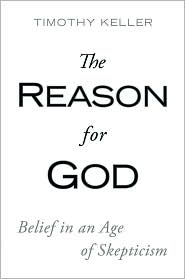Keller attended both Gordon-Conwell Theological Seminary and Westminster Theological Seminary before starting Redeemer Presbyterian Church in Manhattan in 1989. Redeemer currently has over 5,000 members and Keller uses his experiences with the people of his congregation, who come from all different backgrounds and are at different places in their faith journey, to help present his arguments.
In the introduction to the book, Keller clearly lays out his purpose and intention in writing "The Reason for God". While the book was written mainly for skeptics, Keller also addresses believers and states that he hopes his book will help to strengthen their beliefs and provide them with the tools necessary to engage in conversation with others about Christianity. Keller encourages his readers to engage in a dialogue and hopes that this book will begin that discussion.
The first half of "The Reason for God" is devoted to clearing up misconceptions about Christianity and addressing skeptics’ questions about Christian religions. Keller addresses such topics as the idea that there cannot be just one true religion, how God could allow suffering to occur in the world, and the view of Christianity as a straightjacket, or something that restrains people. In each chapter, Keller thoroughly breaks down the topic into its component parts and explains each aspect. The second half of the book is devoted to presenting information and the core beliefs of Christian religions. In the latter half of the book, Keller writes not arguments for the existence of God, but arguments that people already have knowledge of God. He begins by breaking down the topic and explaining it thoroughly in secular terms before finally applying it to Christianity.
As a Christian, I have read several books attempting to explain some of the topics that Keller addresses in "The Reason for God". One of the things I appreciate most about Keller’s work is that he presents his arguments in a coherent manner. Keller avoids sounding pompous about his beliefs by using a conversational tone and it’s clear that he truly does want to engage in a dialogue.
Something else I appreciate about Keller’s work is that he drew from a variety of sources to defend his arguments. Keller uses conversations he has had with members of his church, with believers and non-believers, as well as the work of scientists and other authors to clearly illustrate his points. Keller so systematically explains his ideas, they appear to be common sense by the time he reaches a conclusion on the matter (and he does so without beating his reader over the head with his arguments). The approach Keller uses in explaining knowledge of the existence of God, using sciences and philosophy, is a refreshing change of pace from the usual approaches I have read.
Keller even uses sources such as Richard Dawkins, an atheist, to explain some of his arguments. He looks to Dawkin’s arguments and explains the flaws in them. An example of this would be Keller’s response to the common belief that science has disproved Christianity. Keller breaks down his response into several parts, answering specific questions that are inherent in this widespread idea regarding science and Christianity, such as whether miracles are impossible and if science is in conflict with Christianity. Keller takes arguments Dawkins used in his book "The God Delusion", and explains how they have been oversimplified and points out errors in Dawkins’ interpretation of certain statistics. The very fact that Keller uses sources that are typically used by skeptics and atheists to explain how belief in God is completely rational, simply strengthens his arguments.
With "The Reason for God," Keller succeeds in his mission. He has successfully put forth a book that is easily accessible to a wide audience, not simply intellectuals. He has opened the doors of dialogue between believers and non believers with his straightforward and clear arguments.









No comments:
Post a Comment